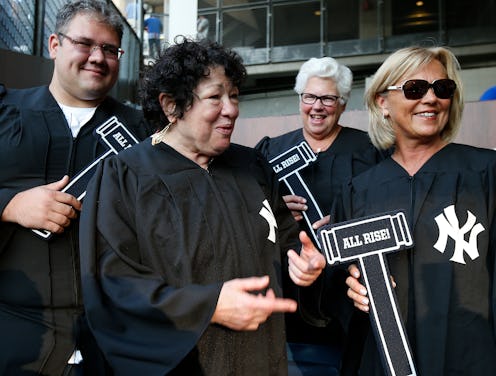Life
This Video Game Helps Spanish Speakers Learn Their Rights — With Sonia Sotomayor’s Help

Politics and civics can be boring to some students, but understanding the rights you have as a citizen is invaluable information. A new video game is trying to change the way students, and especially English language learners, are taught about the U.S. government. Do I Have A Right? is helping Spanish speakers learn their rights — with Sonia Sotomayor’s help.
Do I Have A Right?, which was launched in 2011, now comea in a Spanish-language version called ¿Tengo Algún Derecho? aimed at helping students who may not speak English fluently learn more about their rights. In the video game — which is also available as a phone app — students learn to run a “firm of lawyers who specialize in constitutional law” and then “decide if potential clients have a right, match them with the best lawyer, and win the case.” Players advance in the game with every case they win and every client they serve, and as they develop a better understanding of the Bill of Rights. Different achievement levels can be unlocked as a player progresses — including “Prestige Partner” which is awarded when the player helps 25 clients know their rights, and “Rain Maker,” which is awarded if you make it through the game without losing a single case.
According to NBC News, Justice Sonia Sotomayor, the first Latina U.S. Supreme Court justice, developed the game in partnership with iCivics — a non-profit organization that aims to help students receive a quality civil education (aka, our roles as citizens in our government), and encourages them to get involved in their community through civic engagement. iCivics, which was founded by former justice Sandra Day O’Connor in 2009, provides teachers with free resources for their classrooms. The organization specifically tries to engage students through their educative and interactive games that focus on everything from immigration and passing bills in congress, to letting players pretend to be the president. Studies have shown that providing students with civic education earlier in life improves political understanding, as well as voter participation.
Yosviel, a 12-year-old student who recently immigrated from Cuba to Miami, explained to NBC News that playing ¿Tengo Algún Derecho? has been extremely helpful. “The games allow me to learn about the rights that I have as a citizen. To me, that is important since I am a new immigrant," he said. "The games are also very entertaining and much more fun than traditional homework."
Justice Sotomayor has been a longtime, vocal advocate for the Latinx community, and has called for Latinx citizens especially to create a more civically engaged society. So, it's no surprise that she collaborated with iCivics on Do I Have A Right? and making it more accessible to Spanish-speaking students. iCivics executive director Louise Dube told NBC News, “I think it is [Sonia Sotomayor’s] mission in life to be an inspiration to her community, and to kids in particular. For someone who has come from such humble origins and has achieved so much, it is transparent to the kids and they really identify with her.”
Justice Sotomayor became the first Latina associate justice to serve on the U.S. Supreme Court — and third woman ever — after being appointed by President Barack Obama in 2009, and swore in by the Senate. Justice Sotomayor’s parents immigrated to New York from Puerto Rico during World War II, and she grew up in the Bronx with a single mother after her father passed away when she was nine. After attending Princeton University and Yale Law School, Justice Sotomayor worked at nearly every level of the U.S. judicial system for over 30 years before her become a Supreme Court justice. Sotomayor is making civic engagement more enjoyable for students, and more widely accessible for Spanish-speaking kids. Language or a lack of education should not be barriers that keeps students from receiving a civic education, and thanks to Justice Sotomayor, it isn’t anymore.